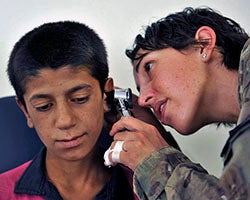
You may have heard their warning countless times... "Turn that music down!" While you might roll your eyes, that warning is for your own good. Listening to music too loud or to other loud sounds can be very bad for your hearing. Loud music is just one way that hearing can be damaged. When someone has hearing loss, there are many different reasons that they have trouble hearing. The two biggest causes of hearing loss are called sensorineural hearing loss and conductive hearing loss.
Sensorineural hearing loss is when the hearing nerve is damaged. This is permanent hearing loss. Although you can heal a broken bone, you often cannot heal a broken nerve. The hearing nerve can get damaged in many ways. One way is with loud music or other loud sounds. Your ear can’t listen to loud sounds for a long time. The tiny hair cells are very fragile. The loud sounds damage your hair cells connecting to your nerve. Some people who work in factories near loud machines have hearing loss now because they did not wear hearing protection.

The nerve can also get worn out over time, which sometimes causes hearing loss in older people. You may have noticed that older people sometimes walk more slowly or have trouble moving around. This may be because their muscles, bones, or nerves have worn down over time. A similar thing can happen with hearing, too. The nerves in the ear have been working hard to hear for a long time and wear down over time. There are lots of other ways the nerve can get damaged. Even if the nerve gets damaged in the same way in two people, the hearing loss they experience may be very different.
Conductive hearing loss is hearing loss caused by the middle part of the hearing pathway. In these cases, the hearing nerve works well, but the middle ear blocks the sound from getting through. Sometimes, conductive hearing loss can be fixed by a doctor with medicine or surgery. Other times, the ear cannot be fixed. Have you ever had an ear infection? Ear infections cause a very small conductive hearing loss. When you take medicine for the ear infection, your hearing goes back to normal.
Additional images via Wikimedia Commons. Paint image by aceebee.
Read more about: How Do We Hear?
Bibliographic details:
- Article: Hearing Loss
- Author(s): Dr. Biology
- Publisher: Arizona State University School of Life Sciences Ask A Biologist
- Site name: ASU - Ask A Biologist
- Date published:
- Date accessed:
- Link: https://askabiologist.asu.edu/hearing-loss
APA Style
Dr. Biology. (). Hearing Loss. ASU - Ask A Biologist. Retrieved from https://askabiologist.asu.edu/hearing-loss
Chicago Manual of Style
Dr. Biology. "Hearing Loss". ASU - Ask A Biologist. . https://askabiologist.asu.edu/hearing-loss
Dr. Biology. "Hearing Loss". ASU - Ask A Biologist. . ASU - Ask A Biologist, Web. https://askabiologist.asu.edu/hearing-loss
MLA 2017 Style

Sound waves are powerful. They can also cause materials to move, like this yellow paint. When people listen to sound that is too loud, it can damage their hearing.
Be Part of
Ask A Biologist
By volunteering, or simply sending us feedback on the site. Scientists, teachers, writers, illustrators, and translators are all important to the program. If you are interested in helping with the website we have a Volunteers page to get the process started.

